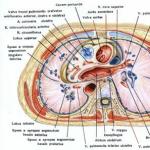Maslow's theory of motivation is one of the most popular in a series of similar ones. The author came to certain conclusions as a result of clinical studies and experiments, this determines the value of his conclusions.
We all know that the more of our needs are met, the greater heights we can achieve in life.
But the actual fulfillment of needs primarily depends on our motivation. Today there are many different motivational theories. In this article I would like to talk about probably the most popular of them – Maslow’s theory of motivation.
In 1943, Psychological Review published an article by Abraham Maslow entitled “A Theory of Individual Motivation.” Within the boundaries of these reflections, Abraham Maslow tried to develop a formulation of the individual’s motivation, which would be based on his needs.
The difference between Abraham Maslow's theory of motivation and the work of famous psychological specialists of that period, such as Skinner and Freud, whose conclusions were mostly speculative or based on the habits of animals, was that it was based on experiments with individuals in hospital settings .
Maslow's pyramid
The basis of motivation according to Maslow is five basic needs:
- sexual and carnal - in movement, breathing, a roof over one's head, procreation, clothing, rest, etc.
- security-related needs - confidence in the future, security and stability in life, in people around, the desire to prevent mistreatment, guaranteed employment;
- needs of a social nature - for interaction with society, for love, for being in a social group, for attention to oneself, for making a contribution to general activities, caring for one's neighbor;
- self-esteem needs - needs for respect from “important others”, social status, career advancement, prestige and recognition;
- moral needs (needs for expression through creativity), embodiment of one’s skills and abilities.
The first pair of needs according to Maslow’s motivation model are classified as primary (innate), the remaining three are secondary, socially acquired. Maslow believed that needs are realized in stages - from lower to higher needs.
Behavior will be motivated by higher-level needs only if lower-level needs are satisfied. In his own model, Maslow gave rise to the principle of dominance or subordination, which significantly distinguishes his model from other similar ones. The intensity of a specific need depends on the place it occupies in the hierarchical structure. Physiological needs are paramount and form a behavioral dominant. The actions and thoughts of an individual whose physiological needs are not satisfied will be entirely focused on their fulfillment.
It turns out that the purpose of the existence of such an individual will be precisely this need. But when a need is fulfilled, there will be a shift in the goals of this individual to the fulfillment of a need of a “higher” order...
Then there are security needs. As usual, they include: the very need for the safety of the individual (protection from difficulties that depend on life activity), in the desire for a stable existence, the need for organization, structure, legality and others (based partly like the first group of needs - on the instincts of self-preservation ). These needs will prevail over all others only in extreme situations, when the individual is aware of a great degree of danger, under pain of death.
If physiological and security needs are satisfied at the required level, the need for love and affection becomes urgent, and the next round of the motivational spiral begins. The individual begins to feel the absence of friends, a girlfriend, a loved one or offspring in a way that he has not felt before. He wants to get friendly, close relationships, he needs a social group that could give him such relationships, a family in which he could feel like he belongs. Just this goal turns into the most important for a person.
Perhaps he had already forgotten that not so long ago, when he was in need and hungry, the word “love” only made him smile disapprovingly. And from then on, he suffers from loneliness, he experiences his rejection with particular pain, looks for information about his ancestors, looks for a friend, a person with the same interests.
Recognition needs are divided into two types. The first includes aspirations that are related to the concept of “achievement”. An individual needs to feel his omnipotence, competence, adequacy; he needs a feeling of self-sufficiency and confidence. Another type of needs includes the need for reputation, the need to gain attention, status, recognition.
Against the background of the embodiment of the needs for respect and prestige, the individual develops a feeling of self-confidence, a sense of self-importance, his correspondence to the world around him, a feeling that he is useful and necessary for this world. An unembodied need, on the contrary, causes a person to feel humiliation and worthlessness, which in turn are a reason for despondency; against their background, neurotic and compensatory processes arise.
Even if all the indicated needs of an individual are satisfied, one can expect that after some time he will again encounter dissatisfaction because his occupation is not at all what his purpose is. It is clear that a musician needs to be interested in music, a painter needs to paint portraits, and a poet needs to write poems if they want to live in unity with themselves.
This need can be called the need for self-actualization. A person begins to search for that area and that activity in which he will be able to show all his abilities, which differ from the skills of other individuals. This can happen differently for each person. Some want to reach extreme heights, while others have small ambitions and are content with little. A certain connection can be seen with the intellectual abilities of the individual himself. The higher the intelligence of a person, the more demanding are her desires, the more individual her needs for self-actualization.
Maslow concluded that lower-level needs operate equally in all people, while higher-level needs operate to varying degrees. For this reason, it is precisely the highest needs that differentiate individuals to a large extent.
At the same time, the higher the level of needs, the more important the role of the individual himself in their conscious education. The individual, driven by needs, in turn creates their content. All needs act cyclically, thus repeating themselves once again, but at a higher level.
Activate your motivation:
- You need to determine (only honestly) your own motivation for each area of your life (work, love, etc.). What level are you at now? Is there anything to strive for?
- If your needs are still at lowest level, think about it, maybe this is the case against the background of insufficient satisfaction within this degree; or have you actually stagnated, and this level no longer meets the requirements of your current status?
- Constantly tell yourself about your next task, for example: “In my career I want to achieve success and prestige.”
- Don't lie to yourself. You cannot indulge yourself and objectively assess your own abilities.
- Hang the definition of the desired level of claims somewhere visible.
- Periodically repeat to yourself: “I am doing this in order to ………………….”.
- Perhaps understanding the need for promotion will not arise immediately. But try to prove this to yourself every day for a long time.
Meanwhile, we are convinced that a huge number of individuals stop moving forward when they achieve success, prestige, and recognition. Having achieved a specific status in a certain field, people often prove to themselves that they already have everything they need (after all, this was a cherished dream some time ago). Only after a while do they begin to realize that they stopped moving in vain, and the current situation no longer meets their requirements. However, the lost time is gone forever.
You should not stop moving at the initial stages of realizing your needs - the fullness of existence lies in constantly improving yourself and the environment. Otherwise, your life will pass inconspicuously, boringly and gloomily, and will be taken for granted.
A fulfilling life is constant improvement of oneself and environment. This is made possible due to the ability of a person to be dissatisfied all the time. That is, satisfaction arises from time to time; it seems to a person that he has everything he dreamed of, but soon his achievements seem incomplete and trivial. Then, the person sets off on a new voyage to get what he lacks for ephemeral happiness this time.
Abraham Maslow thought a lot about this personality trait. After much research, he published an article with the now well-known pyramid of needs. Subsequently, Maslow's theory of motivation arose - which completely confirmed its genius over time.
PyramidMaslow's theory of human motivation was compiled from interviews with hospital patients. Maslow wanted to create motivation criteria that would be based purely on needs:
- Physiological needs - water, food, air, sex drive, sleep.
- The need for security is moral and physical security, a sense of stability.
- The need for belonging is love, friendship, the desire to be part of a team.
- The need for esteem is self-respect and recognition by others.
- Self-realization – morality, spirituality, creativity.
 Realization of needs
Realization of needs
Maslow's theory of motivation is hierarchical in nature. Human needs are realized in stages - from lower to higher, and until the lower is satisfied, a person does not think about the higher.
The first two needs are innate, they are closely related to the instinct of self-preservation. The next three are socially acquired. The need for security has a special status. After its implementation (a person is confident in the future, in his own safety and health), the time comes for love, friendship and involvement in something in common. However, in some circumstances the need for security will be higher than all others - this is the fear of death. As they say, genius is simple, because if we have achieved everything, but a threat to life arises, we again return to this innate need.
Need for loveNext in Maslow's theory of motivation is the need for love. These are attachments, friendship, the desire to have a boyfriend or girlfriend. At this stage, a person feels his loneliness especially acutely and thinks about how nice it would be to share his life with someone.
It never occurs to us to think about how we perceived the need for love while struggling with death, illness or hunger. Then, the concept of “love” caused a grin, but now, it seems, this is the only important thing.
The need for recognition makes us careerists. A person wants to feel his omnipotence and self-sufficiency. We desperately need reputation and again, like nothing else in life. We strive for status, attention and recognition from others.
RethinkingWhen all four needs according to Maslow's theory of human motivation are satisfied, after some time, one can expect a rethinking of life goals.
It suddenly seems to the individual that everything he has lived is idle; he is doing something completely different from what he should be doing.  You have money, your career and family are secure, now it’s time to think about spiritual things. At such moments, some people give up prestigious jobs and become monks, wander the world, become artists and poets.
You have money, your career and family are secure, now it’s time to think about spiritual things. At such moments, some people give up prestigious jobs and become monks, wander the world, become artists and poets.
Maslow discovered that self-actualization needs are directly proportional to personality. That is, the higher the intelligence, the stronger the desire to fulfill one’s destiny. In addition, if the primary needs (innate) are expressed to the same degree in everyone, then the highest needs are individual for everyone. This is why we divide people according to the criteria of their highest needs.
Each personality has specific groups of hobbies. By constantly implementing them, a person reaches great heights, feeling satisfaction in life. For this to happen, motivation is required. Dozens of concepts have been created on this matter, but the most popular is Maslow’s theory of motivation.
What is Maslow's pyramid
The pyramid of needs formed the basic motivation system. Thanks to it, everything a person needs is clearly displayed. This model has another name - Maslow's ladder. This comparison is not accidental, because the individual slowly rises up each step, gradually moving to new level. If the most base requirements are not satisfied, then others will not be realized.
But it is important to realize that the scientist did not share the growth of the horizons of all people and each person individually. Each of us is an individual. Therefore no specific plans, which apply to humanity as a whole.
The meaning of the pyramid hierarchy
Maslow's needs motivation is identified by researchers with the pyramid of power. It is based on existence material assets in humans. The more there are, the more power is required.
Hierarchical thinkers love to use this form of needs. They are confident that success is built solely on competition. The more active she is, the higher the chance of getting to the next step. In theory, a person will feel happy.
Joys are simple:
- finance;
- children;
- family ties;
- Job;
Physiological and spiritual hobbies in the pyramid
The psychologist in his scheme proposed two types of needs:
- physiological;
- spiritual.
Each of us moves from easy to difficult. The teaching is based on primary instincts:
- satisfy intimacy;
- eat;
The next step is the need for safety and order. The third level deals with dreams of being loved and loving. Over 90% of the Earth's inhabitants stop at this position.
Movement on steps
Motivation according to Maslow involves moving to the following groups of needs like this: a person refuses food for a week. For this reason, he thinks about finding food, and not about self-realization. He is simply not interested in anything else.
When an individual has enough food and water resources, only then does he think about safety. He needs clothes to stay warm. Or an apartment in which he will wait out bad weather. This also includes cash savings and the goal of generating growing income. This is the stability that every person is drawn to.

Love in a pyramid
What other passions do people have? They wish great and sincere love. After the initial needs there is a desire for development. The individual is captivated by the goal of being loved and loving.
At this stage, mutual understanding is sought from other people. The professor believed that love cannot be equated with intimate attraction. Further personality formation becomes impossible if a person does not love anyone. This is compared with a lack of beneficial vitamins for the body. If you carefully observe a small child, it will be clear that the proposed theory is correct.
What types of love does Maslow identify? They are divided into the following groups:
- Scarce love. This type is characteristic of selfish people, because... a person, even through forbidden means, wants to get what he needs.
- Giving love. The individual in this example of behavior already understands how unique each person is and accepts his life values.
Self-esteem
When a person has learned to love and receive love from others, he dreams of respect. It is divided into two groups:
- approval from others;
- self-esteem (this includes the desire to achieve goals, professionalism and freedom).
If a person is treated with respect by other people, then he has a feeling of importance and high status. If you have low self-esteem, it is unlikely that you will be able to act effectively. Therefore it needs to be increased. In addition, it is important to feel useful.
Self-improvement as the top step
Self-improvement is at the top of the needs model. In other words, this is a kind of urge to be who you can. To achieve this level of development, you need to realize your needs and abilities. Abraham Maslow said that only a few would achieve this level. This fails because no one believes in their own potential. Everyone is afraid to discover new talents in themselves, because... not ready to achieve success.
The environment also plays a role. In the right society strong man will quickly develop your skills. This evolution can be traced from childhood. In a problematic environment that needs nothing, there is no desire to realize oneself. In this case, Abraham recommended changing his social circle.
Individual approaches to achieve goals
Necessity groups can be implemented in other ways. The individual model often differs from the generally accepted one. For example, the dissatisfaction of any base needs, but at the same time the person moves forward and achieves results.
Years later, Maslow recognized that parallel sets of needs could emerge. For example, self-esteem and the need for food are perfectly combined. In addition, it is worth noting that today not everyone’s basic values are satisfied. However, such patterns of interests do not prevent a person from pursuing self-realization. Low-level needs are satisfied to the extent possible.
Evolution of the theory
Maslow's motivation was refined back in the fifties. He came up with two main groups:
- development;
- addictions.
As a result, the psychotherapist came to the conclusion that people who want self-realization have the following personal qualities:
- democracy;
- naturalness, spontaneity;
- adequate perception of reality;
- focus on goals;
- a kind of mysticism;
- culture.
It was during this period that the scientist abandoned the original model of the hierarchy of needs. This is not taken into account by people who only superficially study the model of life interests. Abraham Harold admitted that absolutely anyone can achieve self-realization if they want to.
Never stop there, improve your needs. The more there are, the better.
We all know that the more of our needs are met, the greater heights we can achieve in life. But the actual fulfillment of needs primarily depends on our motivation. Today there are many different motivational theories. In this article I would like to tell you about probably the most popular of them - Maslow's theories of motivation.
In 1943, Psychological Review published an article by Abraham Maslow entitled “A Theory of Individual Motivation.” Within the boundaries of these reflections, Abraham Maslow tried to develop a formulation of the individual’s motivation, which would be based on his needs. The difference between Abraham Maslow's theory of motivation and the work of famous psychological specialists of that period, such as Skinner and Freud, whose conclusions were mostly speculative or based on the habits of animals, was that it was based on experiments with individuals in hospital settings .
The basis of motivation according to Maslow is five basic needs. Maslow's pyramid of needs:
- sexual and carnal - in movement, breathing, a roof over one's head, reproduction, clothing, rest, etc.
- security-related needs - confidence in the future, security and stability in life, in people around, the desire to prevent mistreatment, guaranteed employment;
- needs of a social nature - for interaction with society, for love, for being in a social group, for attention to oneself, for making a contribution to general activities, for caring for one’s neighbor;
- self-esteem needs - needs for respect from “important others”, social status, career advancement, prestige and recognition;
- moral needs (needs for expression through creativity), embodiment of one’s skills and abilities.
The first pair of needs according to Maslow’s motivation model are classified as primary (innate), the remaining three are secondary, socially acquired. Maslow believed that needs are realized in stages - from lower to higher needs. Behavior will be motivated by higher-level needs only if lower-level needs are satisfied. In his own model, Maslow gave rise to the principle of dominance or subordination, which significantly distinguishes his model from other similar ones. The intensity of a specific need depends on the place it occupies in the hierarchical structure.
Physiological needs are paramount and form a behavioral dominant. The actions and thoughts of an individual whose physiological needs are not satisfied will be entirely focused on their fulfillment. It turns out that the purpose of the existence of such an individual will be precisely this need. But when a need is fulfilled, there will be a shift in the goals of this individual to the fulfillment of a need of a “higher” order...
Then there are security needs. As usual, they include: the very need for the safety of the individual (protection from difficulties that depend on life activity), in the desire for a stable existence, the need for organization, structure, legality and others (based partly like the first group of needs - on the instincts of self-preservation ). These needs will prevail over all others only in extreme situations, when the individual is aware of a great degree of danger, under pain of death.
If physiological and security needs are satisfied at the required level, the need for love and affection becomes urgent, and the next round of the motivational spiral begins. The individual begins to feel the absence of friends, a girlfriend, a loved one or offspring in a way that he has not felt before. He wants to get friendly, close relationships, he needs a social group that could give him such relationships, a family in which he could feel like he belongs. It is precisely this goal that turns into the most important one for a person. Perhaps he had already forgotten that not so long ago, when he was in need and hungry, the word “love” only made him smile disapprovingly. And from then on, he suffers from loneliness, he experiences his rejection with particular pain, looks for information about his ancestors, looks for a friend, a person with the same interests.
Recognition needs are divided into two types. The first includes aspirations that are related to the concept of “achievement”. An individual needs to feel his omnipotence, competence, adequacy; he needs a feeling of self-sufficiency and confidence. Another type of needs includes the need for reputation, the need to gain attention, status, recognition.
Against the background of the embodiment of the needs for respect and prestige, the individual develops a feeling of self-confidence, a sense of self-importance, his correspondence to the world around him, a feeling that he is useful and necessary for this world. An unembodied need, on the contrary, causes a person to feel humiliation and worthlessness, which in turn are a reason for despondency; against their background, neurotic and compensatory processes arise.
Even if all the indicated needs of an individual are satisfied, one can expect that after some time he will again encounter dissatisfaction because his occupation is not at all what his purpose is. It is clear that a musician needs to be interested in music, a painter needs to paint portraits, and a poet needs to write poems if they want to live in unity with themselves. This need can be called the need for self-actualization. A person begins to search for that area and that activity in which he will be able to show all his abilities, which differ from the skills of other individuals.
This can happen differently for each person. Some want to reach extreme heights, while others have small ambitions and are content with little. A certain connection can be seen with the intellectual abilities of the individual himself. The higher the intelligence of a person, the more demanding are her desires, the more individual her needs for self-actualization.
Maslow concluded that lower-level needs operate equally in all people, while higher-level needs operate to varying degrees. For this reason, it is precisely the highest needs that differentiate individuals to a large extent. At the same time, the higher the level of needs, the more important the role of the individual himself in their conscious education. The individual, driven by needs, in turn creates their content. All needs act cyclically, thus repeating themselves once again, but at a higher level.
Activate your motivation:
- You need to determine (only honestly) your own motivation for each area of your life (work, love, etc.). What level are you at now? Is there anything to strive for?
- If your needs are still at a lower level, think about it, maybe this is due to the background of insufficient satisfaction within this level; or have you actually stagnated, and this level no longer meets the requirements of your current status?
- Constantly tell yourself about your next task, for example: “In my career I want to achieve success and prestige.”
- Don't lie to yourself. You cannot indulge yourself and objectively assess your own abilities.
- Hang the definition of the desired level of claims somewhere visible.
- Periodically repeat to yourself: “I am doing this in order to ………………….”.
- Perhaps understanding the need for promotion will not arise immediately. But try to prove this to yourself every day for a long time.
Meanwhile, we are convinced that a huge number of individuals stop moving forward when achieve success, prestige, recognition. Having achieved a specific status in a certain field, people often prove to themselves that they already have everything they need (after all, this was a cherished dream some time ago). Only after a while do they begin to realize that they stopped moving in vain, and the current situation no longer meets their requirements. However wasted time gone forever.
You should not stop moving at the initial stages of realizing your needs - the fullness of existence lies in constantly improving yourself and the environment. Otherwise, your life will pass inconspicuously, boringly and gloomily, and will be taken for granted.
If you find an error, please highlight a piece of text and click Ctrl+Enter.
Nowadays, various methods of personality development are extremely popular. This, on the one hand, is due to the development and accessibility psychological knowledge, and on the other hand, the demand for this kind of scientific research products stimulates these same studies. Among them, various theories of motivation play an important role, helping to effectively achieve goals.
Motivation
Every person has certain needs. The latter can represent both various individual needs and basic needs inherent in us by nature or social conditions. Psychologists carefully study these things, because awareness of one’s needs and the correct allocation of resources to achieve them serves as the foundation for effective activity. Here the question arises about motivation - factors that stimulate a person to strive, to varying degrees, to satisfy his needs.
Abraham Maslow's Theory of Motivation
Among all the motivational theories, perhaps none is as popular today as the theory of the American psychology researcher Abraham Maslow. His idea was first published in 1943 in the work “The Theory of Individual Motivation.” According to Maslow's theory of motivation, the fundamental basis of motivation is human needs. He divides the latter into five groups, which he arranges in a hierarchical order.

Maslow's pyramid of needs
At the bottom of this ladder are the most mundane, biological needs - food, drink, breathing, sex and sleep. Next come security-related needs. For a person, this means not only the need for personal integrity, but also the need for financial stability, social security, and confidence in others. By the way, Maslow’s concept of motivation stands out from other motivational theories of his time because it considers man as a social phenomenon, and not just as a biological being.
The next level of needs includes precisely the most socially significant needs - communication, love relationship, involvement in one or another social groups, the desire to be needed by someone and to feel attention.
The fourth stage combines the individual’s needs for self-affirmation. Here is the need for public recognition, and authority among others, the desire to move up the career ladder, and the like.
Finally, the fifth stage is characterized by the noblest aspirations of the individual. These needs include the desire for self-realization, the thirst for creativity, and the entire spectrum of spiritual values.

Differentiation of the pyramid of needs
According to Maslow's theory of motivation, all five steps of the pyramid are combined into two groups as follows: the first two steps make up a dyad of the so-called innate, basic, primary human needs. The rest make up a triad of secondary, socially determined needs. Such an assessment does not indicate the actual importance of certain needs for a person as social phenomenon, but only regarding their importance for life support. In other words, for biological existence It is enough to satisfy only the first two or even only the very first stage of needs. But without satisfying these needs, it is impossible to reach higher levels, without which, in principle, one can live.
Realization of needs
When it comes to how needs are met in a person's life, Maslow's model of motivation suggests a gradual progression from the bottom up. That is, needs higher in the hierarchy are actualized and can be satisfied only after a person has dealt with the lower levels. Therefore, there is no universal motivation for people - it depends entirely on what level of development a particular person is at. This aspect of Maslow's theory of motivation also significantly distinguishes it from other motivational models proposed by various authors.

Physiological needs
The needs of the first stage, called physiological, as already mentioned, represent the primary needs of a person. This is a dominant that completely captures a person’s attention and efforts if the range of its needs remains unsatisfied. At the moment when the needs of this order are fully (or at least sufficiently) achieved, there will be an automatic shift of needs to a higher level.
Security needs
Safety is the common denominator for the needs of the second stage of Maslow's pyramid. The theory of human motivation also classifies this level as a primary need. It is important to understand that safety refers not only to such environmental conditions when nothing threatens a person’s physical health and life, but also to concern for the preservation of these conditions in the future. Moreover, this level takes into account the need for material and financial security - the need for money, housing, freedom, safety before the law. This group of needs also requires stability in the long term.
Socialization needs
When the first two steps are sufficiently satisfied, then motivation, according to Maslow, shifts its focus of attention higher, to the third step of the pyramid, on which it is located wide range needs for socialization and communication. First of all, this is, of course, the need for friendship, romantic relationships and family ties. A person needs some kind of social community where he can feel like he belongs. He also experiences a strong need for love, which would surpass in content only a sexual relationship. These needs form kinship ties, families, and stable social groups.

Self-affirmation needs
As for the fourth group, Maslow's theory of motivational needs divides them into two categories.
- The first group is somehow associated with the concept of “achievement”. These are aspirations that allow individuals to feel their strength, influence, self-sufficiency, independence, and so on.
- In addition to aspirations for achievement, needs associated with the concept of “prestige” are also identified. This is the second subgroup of the fourth stage, which is identified by Abraham Maslow. Motivation and personality in general are linked here with such things that provide a good reputation, social status, social authority and weight in the eyes of other people.
Remaining insufficiently satisfied, these four groups of needs contribute to the emergence and development of depression and neurotic processes in the individual. The person begins to feel like a failure, worthless and unadapted to the world. Conversely, satisfied needs make a person feel useful and important, which is the key to psychological comfort and mental health of the individual.
Needs for self-realization
In a situation where the first four groups of needs do not cause problems, a person can still feel the need for something higher - in harmony with himself, with the world. This range of needs compels a poet to write poetry, a sculptor to sculpt, and an artist to paint canvases. On at this stage a person needs self-realization, that is, the actualization of his inner potential, the fulfillment of his destiny. This range of needs includes art, religion, mystical practices, philanthropy, charity, etc. Motivation, according to Maslow, is characterized here by a certain relationship between the content of the needs of a given level and the intellectual abilities of the individual. The higher the intelligence, the more serious and deep the needs at the top of the pyramid.

Features of Maslow's theory of motivation
When studying and, especially, practical application of Maslow’s developments, it is important to remember that some steps of the pyramid can change places in the hierarchical ladder from individual to individual. Another feature is that the ladder of needs is cyclical. That is, according to Maslow, the theory of human motivation involves repeatedly going through the entire hierarchy of needs - each time for more high level with more significant and serious requirements.
Maslow's theory and management
IN various programs business training, Maslow's pyramid has found wide application as a good motivation for staff. Maslow is given the role of a pioneer and authoritative researcher in this field. However, in fact, his hypothesis is somewhat more complicated than it might seem at first glance. And the famous pyramid as such is not in his works at all. It first appears in 1970 in one of the German transcriptions of his most important work in the field (Abraham Maslow, Motivation and Personality, 1954).

Criticism of the pyramid of needs
A number of scientists deny the existence of serious grounds for accepting Maslow’s pyramid of needs as working theory. First, they emphasize that Maslow did not support his arguments with experiments. And secondly, those people whom he did study belonged to the ideal categories of the so-called lucky ones, whose all needs were satisfied at the appropriate time. Thus, the famous psychologist remained far from real life most people. Nevertheless, in terms of its significance and practical usefulness (this has been shown by the experience of its use), Maslow’s hypothesis is a fairly meaningful theory of motivation. Maslow is still one of the most influential theorists personal development in terms of motivational technologies.





